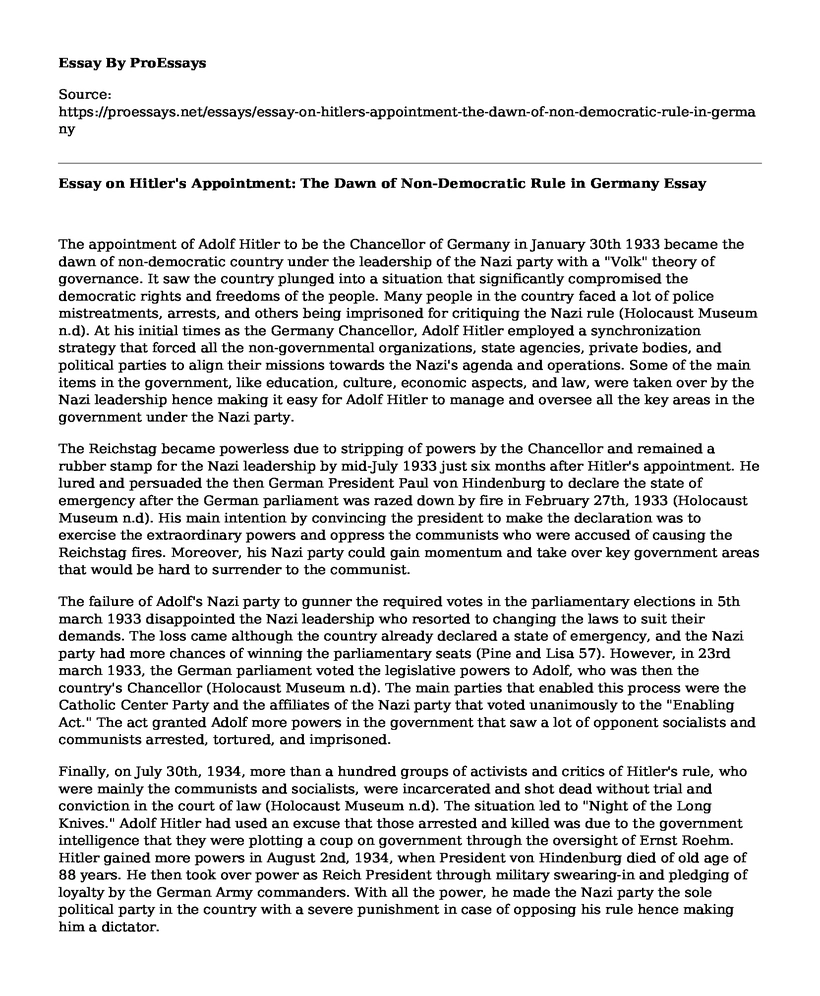The appointment of Adolf Hitler to be the Chancellor of Germany in January 30th 1933 became the dawn of non-democratic country under the leadership of the Nazi party with a "Volk" theory of governance. It saw the country plunged into a situation that significantly compromised the democratic rights and freedoms of the people. Many people in the country faced a lot of police mistreatments, arrests, and others being imprisoned for critiquing the Nazi rule (Holocaust Museum n.d). At his initial times as the Germany Chancellor, Adolf Hitler employed a synchronization strategy that forced all the non-governmental organizations, state agencies, private bodies, and political parties to align their missions towards the Nazi's agenda and operations. Some of the main items in the government, like education, culture, economic aspects, and law, were taken over by the Nazi leadership hence making it easy for Adolf Hitler to manage and oversee all the key areas in the government under the Nazi party.
The Reichstag became powerless due to stripping of powers by the Chancellor and remained a rubber stamp for the Nazi leadership by mid-July 1933 just six months after Hitler's appointment. He lured and persuaded the then German President Paul von Hindenburg to declare the state of emergency after the German parliament was razed down by fire in February 27th, 1933 (Holocaust Museum n.d). His main intention by convincing the president to make the declaration was to exercise the extraordinary powers and oppress the communists who were accused of causing the Reichstag fires. Moreover, his Nazi party could gain momentum and take over key government areas that would be hard to surrender to the communist.
The failure of Adolf's Nazi party to gunner the required votes in the parliamentary elections in 5th march 1933 disappointed the Nazi leadership who resorted to changing the laws to suit their demands. The loss came although the country already declared a state of emergency, and the Nazi party had more chances of winning the parliamentary seats (Pine and Lisa 57). However, in 23rd march 1933, the German parliament voted the legislative powers to Adolf, who was then the country's Chancellor (Holocaust Museum n.d). The main parties that enabled this process were the Catholic Center Party and the affiliates of the Nazi party that voted unanimously to the "Enabling Act." The act granted Adolf more powers in the government that saw a lot of opponent socialists and communists arrested, tortured, and imprisoned.
Finally, on July 30th, 1934, more than a hundred groups of activists and critics of Hitler's rule, who were mainly the communists and socialists, were incarcerated and shot dead without trial and conviction in the court of law (Holocaust Museum n.d). The situation led to "Night of the Long Knives." Adolf Hitler had used an excuse that those arrested and killed was due to the government intelligence that they were plotting a coup on government through the oversight of Ernst Roehm. Hitler gained more powers in August 2nd, 1934, when President von Hindenburg died of old age of 88 years. He then took over power as Reich President through military swearing-in and pledging of loyalty by the German Army commanders. With all the power, he made the Nazi party the sole political party in the country with a severe punishment in case of opposing his rule hence making him a dictator.
Work Cited
Holocaust Museum "Nazi Rule." Encyclopedia.Ushmm.Org, 2020, https://encyclopedia.ushmm.org/content/en/article/nazi-rule. Accessed February 27th, 2020.
Pine, Lisa. Hitler's' National Community': society and culture in Nazi Germany. Bloomsbury Publishing, 2017. 56-59
Cite this page
Essay on Hitler's Appointment: The Dawn of Non-Democratic Rule in Germany. (2023, Apr 09). Retrieved from https://proessays.net/essays/essay-on-hitlers-appointment-the-dawn-of-non-democratic-rule-in-germany
If you are the original author of this essay and no longer wish to have it published on the ProEssays website, please click below to request its removal:
- Paper Example on Cultural Value of Early Republic
- Essay Sample on US Democracy: Crumbling or Strengthening?
- Democracy's Faction Problem: How to Solve It? - Essay Sample
- Essay on Religious Freedom: Embracing Diversity & Respect for All.
- Paper Sample on Marjorie Spruill's Divided We Stand: A Battle Over Women's Rights & Polarized Politics
- Paper on The use of Propaganda and Nationalism in WW1
- The Founding Documents: The Interplay of the Declaration of Independence and the United States Constitution







